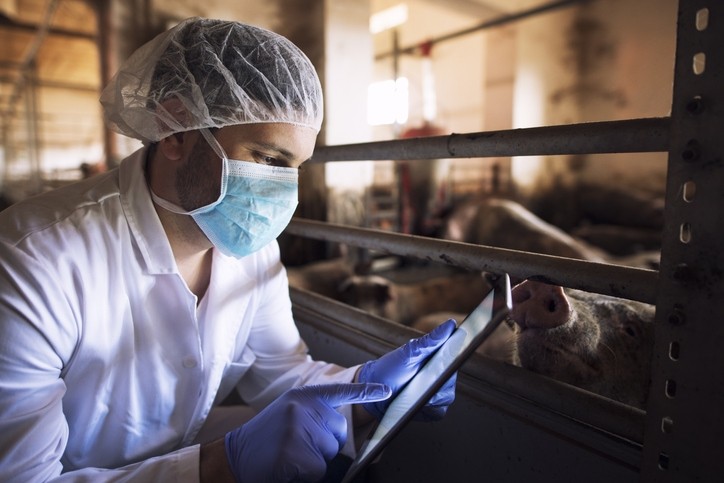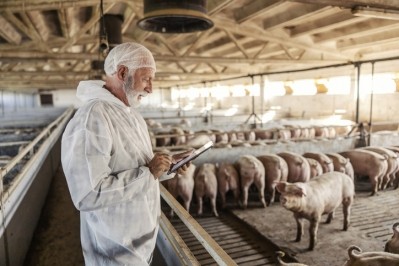Evonik and BASF invest in Chinese digital pig farming tech startup

The value of their investments in the digital farming provider has not been disclosed. Other investors include China’s Shenzhen Sinoagri E-Commerce.
The companies outlined how SmartAHC, which was founded in 2014 by graduates of Nanyang Technological University in Singapore, has developed monitoring devices and software that uses artificial intelligence (AI) and the Internet of Things to improve farm efficiency and animal welfare.
The investors said early detection of disease, enabled by such digital technology, would allow farmers to isolate sick animals and prevent widespread infection.
“The main driver behind this investment is to support new technologies that will improve pig farming for all concerned – the farmers, the consumers and the animals. One aspect of that is the early detection and control of African Swine Fever (ASF) and other diseases,” a spokesperson for Evonik said in an e-mailed response to questions.
A BASF spokesperson told us the mission of its venture capital arm (BVC) is to support BASF’s business and growth strategy by investing worldwide in young companies with disruptive technologies and business models.
"Therefore, BVC is constantly mapping interesting opportunities around the globe. With its investment in SmartAHC, BVC is contributing to BASF’s strategy of promoting sustainability and healthy food. Reducing the human intervention in the farming process is only one aspect. Digitalized processes offer additional new opportunities along the whole value chain."
What does SmartAHC allow?
Based on the data collected and AI algorithms, SmartAHC’s monitoring software platforms are said to provide real-time information through dashboards, statistics and advice, enabling farmers to lower mortality from disease and enable more efficient feeding by selectively administering medication, adjusting the feed or separating sick animals.
“The technology monitors, remotely and in real-time, feed consumption as well as the weight of the animals, allowing farmers to adjust feeding strategies very quickly when necessary,” the Evonik spokesperson commented.
Through digitalization, husbandry operations can optimize labor productivity in the production process, said the investors. SmartAHC allows pigs to be easily counted, identified and observed at any point in time during the rearing and fattening process, explained BASF and Evonik.
Likely adopters
In terms of the scale of pig farmer in China that this technology would be suited to, the Evonik representative told us:
“Pig farming in China is very fragmented with lots of small to medium-sized farms. SmartAHC is initially targeting the bigger and medium-sized farms but there is potential for smaller farms to use the technology too.”
The BASF spokesperson added: "The IoT devices and big data solutions can be adapted to any size of farming activities to make it possible to incorporate criteria for safeguarding animal welfare and ensuring the careful use of resources. Focusing on larger-scale farms is a marketing strategy because SmartAHC finds more willingness from these farms to be change leaders in the industry."
Evonik maintains that there is growing support for the use of digital tools in Chinese pig production:
“Because adoption of digital tools has tangible benefits for farmers, there is a lot of interest in such technologies. Farmers have the advantage of improving the efficiency of the farm with less need for manual labor, lower pig mortality from disease and more efficient feeding. That increases farmers’ financial return as well as improving the quality of their produce and the sustainability of their farms.”
Weighing in on that aspect, BASF said that since contact between humans and animals is considered a cause of the spread of disease in livestock, the Chinese pig farming industry has invested heavily in technologies that can reduce human intervention in the farming process.
"We have [witnessed] active discussions in the livestock industry, all over China, about digitalization. Furthermore, other players along the value chain also embrace [the idea of] reliable digital tools in pig farming such as insurers and banks. Additionally, Chinese consumers purchase more and more fresh products online. Therefore, e-grocery operators are dependent on stable and reliable supplies. Digital solutions installed along the whole value chain can help meat suppliers respond better to requests from e-groceries."
BASF would seem to be going for broke in terms of getting a foothold in the emerging field of digital farming management. Earlier this month, we reported on how it had acquired Cloudfarms, a software company for livestock farm management, traceability and precision farming with a focus on pig production.
Risk assessment
When asked whether this investment was a leap of faith, considering the fact SmartAHC would only seem to be getting off the ground, the Evonik spokesperson said:
“All venture capital investments are associated with a certain amount of risk because startups are by definition very young companies with technologies that are just getting off the ground. Nevertheless, Evonik’s venture capital team does a very thorough assessment of all aspects of the startup – technology, management team, competitive situation – before making an investment decision and SmartAHC is a very promising company.”
The startup also has first mover advantage by being one of the pioneers in the application of IoT and AI technology in the Chinese pig farming industry, said the BASF representative.














